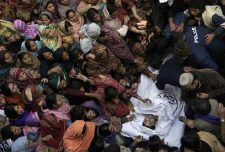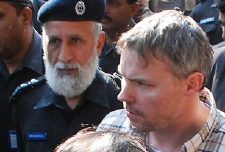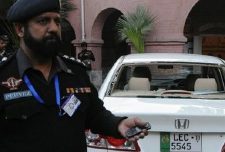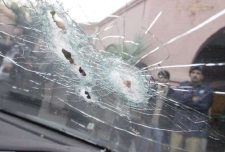Adil Najam
UPDATE POST HERE: March 16, 2011: Raymond Davis Released! This Story Ain’t Over Yet!
Strangely, the more we get to know about the case of Raymond Davis, the less we seem to know. Even more strangely, the fact that the entire incident happened in broad daylight and in front of dozens of witnesses seems is itself confusing the facts rather than adding clarity. Moreover, it seems that no one seems to want to get much clarity either; although different parties may want different parts of the story to ‘disappear.’ The incident was rather eerie and disturbing to begin with; and it continues to become more so.




Here is what one does know. Raymond Davis, a staff member of the US Consulate in Lahore shot two Pakistani men dead on Thursday in a crowded part of Lahore (Mozang Chowk), according to him in self-defense. A US Consulate vehicle that rushed in to ‘rescue’ Mr. David then ran over a third person, who also died. A murder case was then registered against Raymond Davis, who was handed into police custody. A case has also been registered against the driver of the US Consulate vehicle that ran over a third person, but the driver has not yet been apprehended. After a fair deal of scrambling by both US and Pakistani officials on what to do or say, the positions of both have now started becoming clear and they have taken the stance that is usually taken in such cases: the US is asking that Raymond Davis, as a diplomatic functionary, should be handed back to them; Pakistan seems to be responding that the matter is sub judice and should take its course.
Beyond that, there are more questions than answers. For most part, these questions fall into three categories: (1) Questions about who is Raymond Davis? (2) Questions about exactly what happened at Mozang, Lahore? (3) Questions about what should happen now ?
On the first question, earliest reports suggested that Raymond Davis was a “technical adviser” and a “consular” official. More recently, US Embassy officials have described him as a “functionary” of the Embassy assigned to the US Consulate in Lahore and carrying a US Diplomatic passport. Reportedly he was hired at the US Consulate in Lahore as a security contractor from a Florida-based firm Hyperion Protective Consultants. All of this has material relevance to whether he would enjoy diplomatic immunity or not, but even more because of the apprehensions of many Pakistanis that he could be linked to the CIA or to the infamous firm Blackwater (later renamed XE Services).
And that leads squarely to the second question: what exactly was happening at Mozang? Very much in line with the immediate knee-jerk reaction of many Pakistanis, an early commentary by Jeff Stein in The Washington Post seemed to suggest rather fancifully that the shootout could have been a “Spy rendezvous gone bad?” That would be a conspiracy theory, but not an entirely implausible one. Mozang is not a part of town that you would expect too many foreigners, let alone a US official, visiting; and certainly not in what was reportedly a rented private vehicle. And while Pakistan today is clearly an unsafe place, the question of just why an Embassy official was carrying a firearm be wished away. On the other hand, however, Mr. Davis claims that he shot in self defense as the two men on the motorcycle were trying to rob him at gun point. Anyone who knows Pakistan knows all too well that this, too, is entirely possible. TV footage and reports coming immediately after the incident showed one of the young men lying dead with a revolver and wearing an ammunition belt. And certainly, the question of why at least one of the two young men on the motorcycle was carrying a loaded firearm cannot be wished away just because he had “dushmani.” Indeed, serious questions need to be asked about just who the two young men on the motorcycle were, just as they need to be asked about who Raymond Davis is. There just seem to be too many unnecessary weapons in too much proximity in this story. All of the many explanations that are floating around are very disturbing, but also very plausible. Which is exactly why this story is even more dangerous if left unresolved.
Finally, the third question – which is now getting the most attention – about what should happen now. Much is being made – maybe too much – about the Vienna Convention and its implications for diplomatic immunity. Familiar diplomatic games about the minutia of vocabulary are being played and will in most likelihood result in all too familiar results. That is exactly what one would expect in any such situation anywhere. But this is not ‘any‘ situation’; and this is not ‘anywhere‘. This is about US-Pakistan relations: there is just about nothing that the US can say or do which Pakistanis are likely to believe, and there is just about nothing that Pakistan can say or do which Americans are likely to trust. Which is why getting stuck in the intricacies of the Vienna Convention of 1963 is the exact wrong place to get stuck. This is a time for public diplomacy: certainly from the US and maybe even from Pakistan. It is not in America’s interest to be seen to be standing in the way of justice and due process. And it is not in Pakistan’s interest to be seen to conducting a flawed process of justice. There are too many people on the extreme in both countries who will not and cannot to change their opinion and apprehensions about the other. But there are even more people in both countries who could all too easily be swayed to the extremes on distrust if this delicate case is not handled with clarity and transparency by both countries. Doing so will probably bring with it more than just a little diplomatic embarrassment. Not doing so can only bring worse in the tinderbox that is US-Pakistan relations.




















































I have come to this late but this is one of the most sensible write-ups I have read on this. You raise the right questions. Everything else I have read seems to already have made up their mind on what the verdict is without even considering what questions need to be answered and people are just projecting their biases – pro- or anti-American – on to this story. Thanks.
نابینا جنم لیتی ہے اولاد بھی اس کی
جو قوم دیا کرتی ہے تاوان میں آنکھیں
Do we remember Z.A. Bhutto’s episode when he had offended Henry Kissinger by refusing to yield under his pressure? Henry Kissinger during his visit to Pakistan had demanded closing of Pakistan’s Nuclear Programme. In retaliation, Kissinger had sent a harsh letter to Bhutto signed by his deputy, Cyrus Vance saying that: “If Pakistan continued with its nuclear programme “the Prime Minister would have to pay a heavy price”. Kissinger had also threatened Bhutto in the words: “We will make an example of you”.
That prompted Bhutto to bring the matter to public. Immediately, he held an impromptu public meeting at Raja Bazar Rawalpindi and disclosed some of the letter’s contents saying that, Americans were against him for taking a stand on Pakistan’s Nuclear Programme. Surprisingly, that incident coincided with the start of a joint movement against him, of all opposition parties (PNA) headed by Mufti Mehmud (father of Maulana Fazal-ur-Rehman), which Bhutto blamed was engineered by the CIA, in retaliation. After several rounds of negotiations between Bhutto and the PNA, a final “round-table meeting was held at “Sihala Rest House”, which kept topsy-turvying for several days before coming to a deadlock resulting in the 4th July, 1977 military coup of Zia-ul-Haq.
Today, almost similar events are being created after the intriguing “Raymond Davis” shooting incident. Do we have any mind to learn from our horrible history of senseless mistakes?
Maybe the US should just apologize. Once in a while it is good to do that when you are really at fault.
@Adnan
No bhai jaan we’re not going to quit Pakistan. Its easy to sit 3000 miles away in the U.S and talk about the virtues of Secular/ liberal values but the U.S doesn’t need them as much as Pakistan does. So we’re going to stay right here and push for change, regardless of how long it takes
Have fun!!….:P